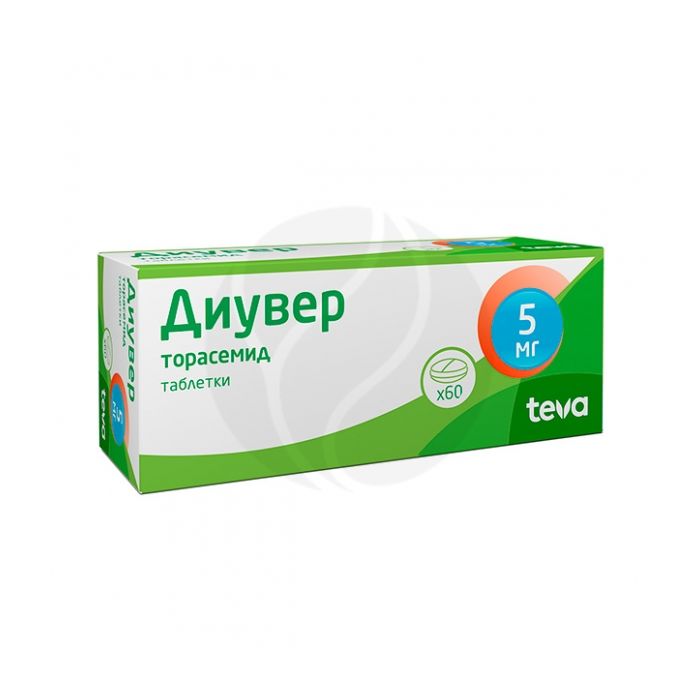Diuver 5mg tablets, No. 60
Expiration Date: 05/2027
Russian Pharmacy name:
Диувер таблетки 5мг, №60
Edematous syndrome of various origins, incl. with chronic heart failure, diseases of the liver, lungs and kidneys; arterial hypertension.
Inside, once a day, after breakfast with a little water.
Edematous syndrome of various origins, incl. with CHF, diseases of the liver, lungs and kidneys
The usual therapeutic dose is 5 mg orally once a day. If necessary, the dose should be gradually increased to 20-40 mg once a day, in some cases up to 200 mg per day. The drug is prescribed for a long period or until the edema disappears.
Arterial hypertension The
starting dose is 2.5 mg (1/2 5 mg tablet) once a day. If necessary, the dose can be increased to 5 mg once a day.
Elderly patients do not need dose adjustment.
Active substance: torasemide
- Hypersensitivity to torasemide or any of the components of the drug;
- allergy to sulfonamides (sulfonamide antimicrobial agents or sulfonylureas);
- renal failure with anuria;
--hepatic coma and precoma;
--severe hypokalemia;
--severe hyponatremia;
- hypovolemia (with or without arterial hypotension) or dehydration;
--severely expressed disorders of the outflow of urine of any etiology (including unilateral lesions of the urinary tract);
- glycosidic intoxication;
- acute glomerulonephritis;
pharmachologic effect
A 'loop' diuretic. The main mechanism of action of the drug is due to the reversible binding of torasemide to the Na + / Cl- / K + cotransporter located in the apical membrane of the thick segment of the ascending loop of Henle. As a result, the reabsorption of sodium ions is reduced or completely inhibited and the osmotic pressure of the intracellular fluid and water reabsorption decrease. Blocks aldosterone receptors in the myocardium, reduces fibrosis and improves diastolic myocardial function. Torasemide, to a lesser extent than furosemide, causes hypokalemia, while it is more active and its effect is longer. The maximum diuretic effect develops 2-3 hours after taking the drug inside. The use of torasemide is the most reasonable choice for long-term therapy.
Indications
Edematous syndrome of various origins, incl. with chronic heart failure, diseases of the liver, lungs and kidneys; arterial hypertension.
Contraindications
- Hypersensitivity to torasemide or any of the components of the drug;
- allergy to sulfonamides (sulfonamide antimicrobial agents or sulfonylureas);
- renal failure with anuria;
--hepatic coma and precoma;
--severe hypokalemia;
--severe hyponatremia;
- hypovolemia (with or without arterial hypotension) or dehydration;
--severely expressed disorders of the outflow of urine of any etiology (including unilateral lesions of the urinary tract);
- glycosidic intoxication;
- acute glomerulonephritis;
Method of administration and dosage
Inside, once a day, after breakfast with a little water.
Edematous syndrome of various origins, incl. with CHF, diseases of the liver, lungs and kidneys
The usual therapeutic dose is 5 mg orally once a day. If necessary, the dose should be gradually increased to 20-40 mg once a day, in some cases up to 200 mg per day. The drug is prescribed for a long period or until the edema disappears.
Arterial hypertension The
starting dose is 2.5 mg (1/2 5 mg tablet) once a day. If necessary, the dose can be increased to 5 mg once a day.
Elderly patients do not need dose adjustment.
Side effects
Hyponatremia, hypochloremia, hypokalemia, hypomagnesemia, hypocalcemia, excessive decrease in blood pressure, orthostatic hypotension, collapse, tachycardia, hypercholesterolemia, hypertriglyceridemia; transient increase in the concentration of creatinine and urea in the blood, oliguria, acute urinary retention, nausea, vomiting, diarrhea, intrahepatic cholestasis, increased activity of liver enzymes, thrombocytopenia, leukopenia, agranulocytosis, aplastic or hemolytic anemia.
Overdose
Symptoms: excessively increased diuresis, accompanied by a decrease in the BCC and a violation of the electrolyte balance of the blood, followed by a pronounced decrease in blood pressure, drowsiness, confusion, collapse; possible gastrointestinal disturbances.
Treatment: there is no specific antidote. Induce vomiting, gastric lavage, and prescribe activated charcoal. Reducing the dose or discontinuing the drug and at the same time replenishing the BCC and indicators of water-electrolyte balance and acid-base balance under the control of serum electrolyte concentrations, hematocrit, symptomatic treatment. Hemodialysis is ineffective.

